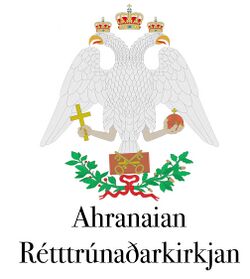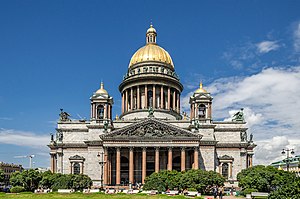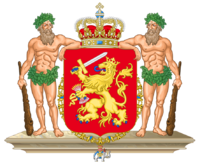Ahranaian Orthodox Church
| Ahranaian Orthodox Church | |
|---|---|
| Abbreviation | AOC |
| Classification | Orthodox |
| Orientation | Ahranaian Orthodox |
| Polity | Orthodox |
| Æðsti ríkisstjóri | Monarchs of the Kingdom of Ahrana |
| Fyrstur meðal jafningja | Karl Stephan XV, Metropolitan of Moskovo |
| Region | Ahrana |
| Founder | Apostol |
| Origin | 1547 CE Vulga Supra, Kingdom of Xara |
The Ahranaian Orthodox Church is the most populous Church in Ahrana next to the Old Believers, between the two the Churches that make up the Majority of the Populations Faith there are other Churches that have been granted the liberty to practice next to the Ahranaian Orthodox Church. The Orthodox Church is main Church of the Imperial Household and has been since the Church was founded and since Christianity was established in then Ahran.
Over the years many Kings and Queens have been crowned in the Holy Cathedral of the Orthodox Church in Moskovo by the Primate at the time, the bond of the Imperial Throne and the Throne of the Church to which Christ himself sits upon are entwined through the Crowning of the King or Queen of Ahrana. It is the belief of all Ahranaian Orthodox Faithful that the King or Queen is picked by God who picks the person to rule in his place through the teachings he has left us through the life of his Son and the Apostles.
Theology
Trinity
Orthodox Christians believe in the Trinity, three distinct, divine persons (hypostases), without overlap or modality among them, who each have one divine essence —uncreated, immaterial and eternal. These three persons are typically distinguished by their relation to each other. The Father is eternal and not begotten and does not proceed from any, the Son is eternal and begotten of the Father, and the Holy Spirit is eternal and proceeds from the Father. Orthodox doctrine regarding the Trinity is summarized in the Creed.
In discussing God's relationship to his creation, the theology distinguishes between God's eternal essence, which is totally transcendent, and his uncreated energies, which is how he reaches humanity. The God who is transcendent and the God who touches mankind are one and the same. That is, these energies are not something that proceed from God or that God produces, but rather they are God himself: distinct, yet inseparable from God's inner being.
With understanding the Trinity as "one God in three persons", the "three persons" is not to be emphasized more than "one God", and so forth. While the three persons are distinct, they are united in one divine essence, and their oneness is expressed in community and action so completely that they cannot be considered separate from one another. Their "communion of essence" is "indivisible". Trinitarian terminology—essence, hypostasis, etc.—are used "philosophically", "to answer the ideas of the heretics", and "to place the terms where they separate error and truth." The words do what they can do, but the nature of the Trinity in its fullness is believed to remain beyond man's comprehension and expression, a holy mystery that can only be experienced and one that will not be explained by the Orthodox Church.
Sin, Salvation and the Incarnation
According to the Ahranaian Orthodox faith, at some point in the beginnings of human existence, humanity was faced with a choice: to learn the difference between good and evil through observation or through participation. The biblical story of creation of mankind relates this choice by mankind to participate in evil, accomplished through disobedience to God's command. Both the intent and the action were separate from God's will; it is that separation that defines and marks any operation as sin. The separation from God caused the loss of (fall from) his grace, a severing of mankind from his creator and the source of his life. The end result was the diminishment of human nature and its subjection to death and corruption, an event commonly referred to as the "fall of man"
When the Ahranaian Orthodox Faithful refer to fallen nature they are not saying that human nature has become evil in itself. Human nature is still formed in the image of God; humans are still God's creation, and God has never created anything evil, but fallen nature remains open to evil intents and actions. It is sometimes said among the Orthodox Faithful that humans are "inclined to sin"; that is, people find some sinful things attractive. It is the nature of temptation to make sinful things seem the more attractive, and it is the fallen nature of humans that seeks or succumbs to the attraction.
Structure
The Ahranaian Orthodox Church has undergone a transfiguration in leadership structure after the Diarchs announced that the Imperial Throne would no longer be a part of the Clerical proceedings like it had been in the past. As of now the Metropolitan of Peterburi is now the Patriarch of all Orthodox Churches in the Realm of the United Kingdom of Ahrana with the Metropolitan of Moskovo, the Metropolitan of Vulga Supra, the Metropolitan of Skaro, and the Metropolitan of Kjos make up the highest offices of the Church in Ahrana.
The Ahranaian Orthodox Churches outside of Ahrana are under the direct authority of the Patriarch of the Ahranaian Orthodox Church. The Churches outside of Ahrana are structured the same way and all Bishops, Archbishops, and Metropolitans report directly to the Patriarch.
Chairman of the Most Holy Synod
The Synod only convenes in total communion with all Orthodox and Catholic Orthodox Leaders when needed or when the Diarchs call for a meeting of all Church leaders to discuss an issue of faith. Since the Church underwent leadership changes the Synod has not met since the last Synod which was the 115th Synod.
Metropolitan of Peterburi
The Office of Metropolitan of Peterburi is the oldest Diocese inside the Kingdom of Ahrana, it is where the church was founded and decreed as the Religion of Ahrana and her peoples. Why the church was established in the northern capital of the then Ahranaian Empire is unknown to historians, but none the less the Diocese remains in control of the entire Orthodox Church inside Ahrana. The Metropolitan is also the Patriarch of the entire Ahranaian Orthodox Church and is seen as the First Among Equals by all Metropolitans and the Catholic Orthodox Patriarch in the Synods.






